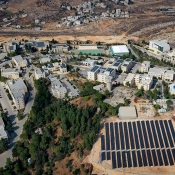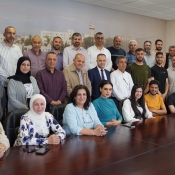Institute of Law legal session examines recently-ratified Landlords and Tenants Law
The Institute of Law at Birzeit University, together with the Konrad-Adenauer-Stiftung, held a legal discussion on the recently-ratified Landlords and Tenants Draft Decree-Law for the year 2018, on Saturday, November 17, 2018. The session featured Tareq Touqan, Ashraf Abu Al Hayi, and Ghassan Kishawi, three experts and activists in socio-economic human rights - especially in the right to housing.
Mahmoud Alawna, a professor of law at Birzeit University, emphasized the importance of holding such discussion sessions at a time when undeclared amendments to the Landlords and Tenants Law are being pursued, adding that this has been an ongoing trend with a number of recent laws by decree ratified and approved without consulting the Palestinian community.
Alawna also detailed the significance of reviewing the Landlords and Tenants Law in Palestine within the appropriate context, saying that the topic which the law addresses is sensitive and impacts socio-economic realities in Palestine and affects the working class as well as landlords.
Alawna noted that, globally, such amendments which affect crucial laws are usually put into effect after several years of deliberations and consultations.
In his address, Touqan reviewed the Landlords and Tenants Law from the perspective of a landlord, and provided an overview of global trends in drafting similar laws, pointing out that international trends favor striking a balance between the interest of both landlords and tenants.
Touqan also stressed the importance of drafting such a law within the context of an effective, professional judicial apparatus, and called for the current law draft to be amended in such a fashion that takes into consideration the effectiveness of the Palestinian judicial apparatus.
Kishawi, from Gaza through Skype, mentioned the significance of such legal discussions that the Institute of Law regularly holds and gave an overview of the recently-ratified relevant legislation in Gaza, such as the Rent Law No. 5 of 2013 and its amendments in 2014.
The rent law, Kishawi opined, did not take into account the difficult economic circumstances in Gaza. The legislative process, he said, needed an overhaul that would bring it closer to the economic realities of the people and to a united country.
Abu Al Hayi explored the legal and human-rights-based drawbacks of the Landlords and Tenants Law and observed that the true issue with the government is a weak legislative policy, something that can be clearly seen in the recent laws by decree that it ratified, he said. Additionally, the government regularly adopts laws by decree without incorporating the civil community and non-governmental organizations, he noted.
Abu Al Hayi also expressed his concerns about adopting such a far-reaching law without the presence of a legislative authority and under current circumstances of the Palestinian judiciary, in addition to the Palestinian government’s disregard of the international treaties which stipulate that laws should be harmonized with international standards and conventions.
The right to housing, Abu Al Hayi commented, can be understood in essence to be as significant as the right to education and the right to health, which means that the legislature has to take into consideration its importance and strike a healthy balance in meeting its obligations with regard to human rights.
At the end of the session, the floor was given to the attending students, legal experts, and government representatives to discuss controversial aspects of the Landlords and Tenants Law.








